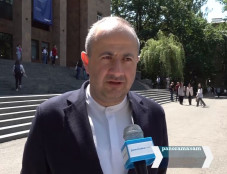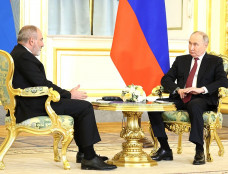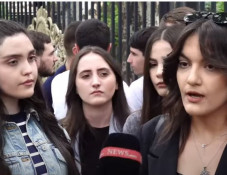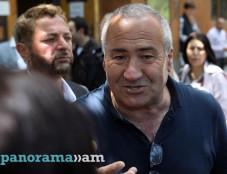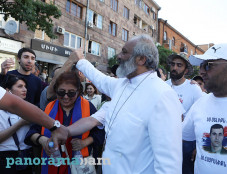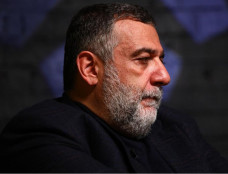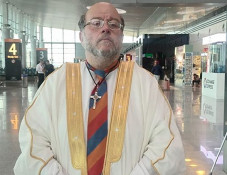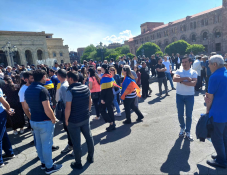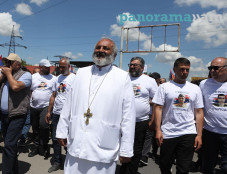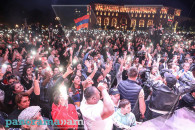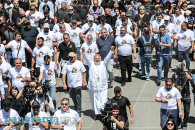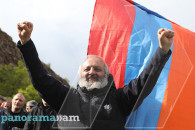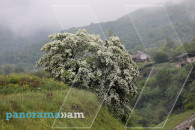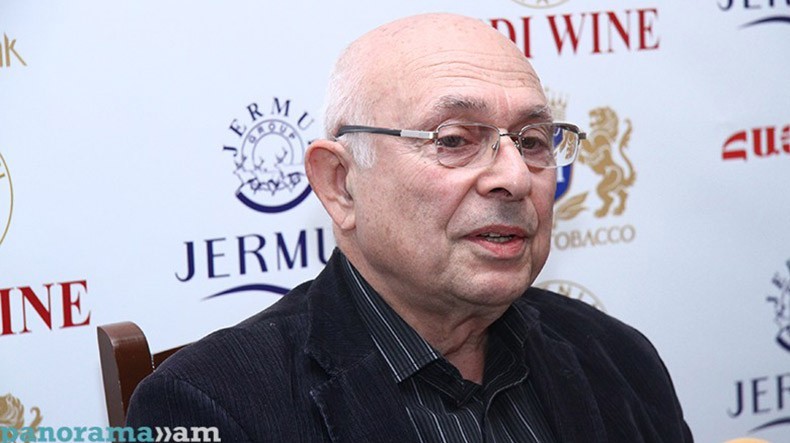
Rouben Galichian: For Azerbaijani historians, issues of their people’s origin are flexible and alterable theories
Before the October revolution, rural or nomad Muslims, whether they were Turkmen, Uzbek, Kyrgyz, Kazakh or Karakalpak, had no notion of belonging to some nation, something that can also be said about the Tatars from Volga or Azerbaijanis, famous cartographer Rouben Galichian writes in his book Historical and Geographical Falsifications of Azerbaijan, a historical, cultural and cartographical research based on a detailed analysis backed by documentary evidence. In particular, Galichian references A. Bennigsen (1913-1988), a researcher of Muslim peoples in the Russian Empire and Soviet Russia, who notes that the ‘Azeris’ living in the territory of modern Azerbaijan called themselves ‘Turks,’ while Islam is what unites the republic.
According to the author, in 1918, the territory lying to the north of Araks declared independence choosing the name Azerbaijan Democratic Republic for itself. “This is how the local people calling themselves Turks and sometimes Tatars and Muslims, started to be called Azerbaijanis in May 1918 due to a political decision which came to effect at a stroke of a pen,” he writes and points out that the fact that, even two decades later, until 1936, the locals still continued calling themselves Turks, confirms that that ethnonym was alien to them.
A.K. Alekperov, an Azerbaijani researcher, writes in Studies of Azerbaijan's Archaeology and Ethnography that the name Azerbaijani went into a wider usage among the Azerbaijani population only after 1936. “Before that, the name Turks was used instead of Azerbaijanis. This was connected with the counterrevolutionary activities of the pan-Turkists, Musavatists, pan-Islamists and other enemies of the Azerbaijani people, who, for years, supported that name, which was alien to the Azerbaijanis,” Alekperov writes as cited by Galichian.
However, the Azerbaijani authorities and the historiography, which worked on their order, ‘seemed to be blinded by their own exaggerations’ and started to believe that Azerbaijan has over five-thousand-year-long history in the region and that they had lost their statehood only in 1813-1828 as a result of the Russian-Persian wars, which was restored just a hundred years later, Galichian writes.
By claiming this, they try to prove that Iran’s Safavids and all the Muslim kings preceding them were really ‘northern Azerbaijanis’ and that it was Northern Azerbaijan that lost its statehood because of the Russian-Persian war between 1813-28. As a result, according to the ‘groundless Azerbaijani theories and falsifications,’ it was Azerbaijan rather than Iran that surrendered the region to Russia in 1828, Galichian writes.
Postulating the scientific principal that the country receives the name of the people living in it, and not vice versa, as in the case of Azerbaijan, Galichian writes that there are often no borders drawn on Medieval maps and only the name of the people inhabiting a given region is mentioned, as it was deemed more important than the name of the territory or region. “Demarcation of borders on maps became more popular in a later period, in 14th and 15th centuries. In Azerbaijan’s case, the reverse process took place. The people of that country started to be called by a name borrowed from the name of a province of the neighbouring country,” Galichian writes.
Galichian references the handbook The Peoples of the USSR by Professor Ronald Wixman, an American specialist on nationalities and cultures and author of many ethnographic studies. According to Wixman, although the Azerbaijanis speak a Turkic language they are a mixed of Turkic, Iranian, and Caucasian ethnic background. “The Azerbaidzhans are still in the process of assimilating the Moslem Tati, Talysh, Kurds, Shahdag peoples, Udi, and southern Dagestani (Lezgins, Avars, and Tsakhurs) residing in the Azerbaidzhan SSR, and the Ingiloi (Shiite Moslem Georgians) in adjacent areas of the Georgian SSR,” Wixman writes.
Galichian also cites a noteworthy detail. Russian writer I. Kulakin calls Azerbaijan’s people Turks in his report about the mutual recognition of the Soviet peoples presented at the First All-Union Congress of Soviet Writers in Moscow in 1934.
Further, Galichian exposes diametrically opposed and mutually excluding approaches circulating in the Azerbaijani scientific circles regarding the ethnogenesis of those people. In particular, he cites an article titled “Who are we, where do we come from and where are we going?” by the head of the History Department of the National Academy of Sciences of Azerbaijan, F. Alekperli. “Upon Stalin’s will, we were called Azerbaijanis in late 1930s. Until 1936, People in the Democratic Republic of Azerbaijan (1918-1920) and Azerbaijani Soviet Republic were officially known as Turks... Having lost our national self-identification, we got stuck in debates on who we are, i.e. whether we descend from Sumerians, Talish tribes, Albanians, Medes or some other ethnic group. There’ll be no end to such tiresome and stupid debates unless we recognize that our true ethnic origins are disguised behind the featureless term ‘Azerbaijanis’. We descend mostly from Turks, as well as Kurds, Tats, Lezghins etc,” Alekperli points out.
However, academician Igrar Aliyev, the former head of the History Department of the National Academy of Sciences of Azerbaijan, 20 years before his successor Alekperli claimed that the population of the Azerbaijani Republic does not have a Turkic origin, as it descended from the Medes and tribes inhabiting the Persian province Atropatene.
“These mutually excluding opinions prove that the key matters regarding the formation of the Azerbaijani ethnos and the country’s history have not still found an ultimate solution even in the Azerbaijani scientific circles,” Galichian highlights.
Besides, the overwhelming majority of the historical studies written in Azerbaijan in Soviet and contemporary period intend to prove that the people of the modern Azerbaijan are natives in the region and originate from Albanian tribes, Galichian writes.
The other side of the coin however, is that the confirmation of the theory of the Azerbaijani people’s ‘Albanian origin’ can bring about a range of negative political and economic outcomes for the Azerbaijani Republic. In particular, this may result in controversy with Turkey, an ally and friend, which perceives Azerbaijan as a ‘member of the pan-Turkism’ club and Azerbaijanis as ‘people descending from Turkish tribes.’ It sees ‘no benefit’ in defending Azerbaijan’s historical or national ties with Albania as it prefers to regard Azerbaijan’s population as people having Turkic origin.
“The loss of an important ally like Turkey can seriously harm Azerbaijan, especially in the military context of the region. That is why the authorities and intelligentsia in Azerbaijan try to prevent such problems by looking for ways to represent their country and people as Turkey’s friend, kindred and historical ally,” Galichian highlights.
However, he writes that the Azerbaijanis have found a ‘Judgment of Solomon’ as how to relate the Azerbaijanis to the Oghuz Turks meanwhile appropriating the Armenian cultural monuments. The Monuments of Western Azerbaijan (2007), a book published in Baku in three languages and three different editions, pursed that ‘dual aim.’ The caption of the map of modern Armenia on the first page of the book reads: The map of western Azerbaijan (actually the “Republic of Armenia”) the homeland of the ancient Oghuz Turks. “This means that the Azerbaijanis ‘take’ their ancestors, Oghuzes, to the Caucasus and try to claim them natives of the region, which will best serve their aim, as they do not want to leave the list of the native peoples of the Caucasus,” Galichian writes.
As a result, according to the plan, the Azerbaijanis obtain a chance to claim that they originate from both the Oghuzes and Albanians without cutting themselves off the Caucasian territory. Galichian also cites another book, published in Azerbaijan by N. Gurbanov. The book is titled Azerbaijan and Turkey: One nation in two states, which already reveals its essence. It is a slogan Azerbaijan often uses when needing alliance and support from Turkey.
Remarkably, the theory that the Turkic tribes are ancient natives of Asia Minor is also popular in Turkey itself. The authorities and historiographers there claim the same trying to legitimise that made-up legend. “This is the arena where Azerbaijan and Turkey’s propagandistic efforts fully coincide. The name Armenia is totally removed from the historical maps of the region embracing the period from Urartu epoch to 1918 in the school history atlases both in Azerbaijan and in Turkey. Meanwhile, Azerbaijan takes up the most part of the territory of the Southern Caucasus, including the territories of the modern Republic of Armenia,” Galichian writes.
“Depending on the circumstances, our neighbouring republic either declares the Christian Albanians as their historical ancestors or claims they originate from the Turkic tribe of Oghuzes, who are allegedly a native nation of the region. Azerbaijan disregards the fact that the Turkic tribes first migrated from Central Asia and reached the territory of the Caucasus only in the 9th and 10th centuries. It repeatedly claims its ancient presence in the region situated to the south of the Caucasus mountains,” Galichian writes.
The necessity to claim the Azerbaijanis’ ‘Albanian origin’ assumes that, by ‘exiling’ the Armenians from the South Caucasus, the Azerbaijanis could make claims on the Christian cultural monuments and memorials still preserved in the territory of the Azerbaijani Republic as their heritage. Morevor, they sometimes even call the Albanians ‘Azerbaijanis,’ Galichian notes.
“Meanwhile, the people of the modern Azerbaijani Republic were historically formed from all the conquerors, who passed through the region, from the tribes that temporarily ruled in the region, from all the nations and tribes, including Albanians and Persians, Azeris of Atrpatakan, Seljuqs, Mongols, and many other ancient tribal unions which arrived from Central Asia or lived in the region.” According to Gaichian, this is the theory recognised among objective historians and ethnographers who ‘view the matter without any political or diplomatic interests,’ namely, Strabo, Pliny, Gervase of Tilbury, Ranulf Higdon and others.
As for the possible reason why the Azerbaijani authorities and scientific circles ‘reject the historical truth about Azerbaijani nations’ origin,’ Galichian does not exclude that they may think that by admitting the fact they descend from peoples of various tribes and cultures they will ‘exclude the opinion that the Azerbaijani people have an ancient distinctive national history.’ As a result, the Azerbaijanis will have to confess that the contemporary culture referred to as ‘Azerbaijani’ belongs to the ancestors of all the nations, which today make up Azerbaijan’s population. Moreover, the mixture of various cultures cannot be called ‘distinctive Azerbaijani culture which existed throughout centuries,’ while this is the Azerbaijani authorities’ main aim.
“Calling Azerbaijan an ‘ancient country’ and its culture ‘ancient Azerbaijani culture’ is the same as if the US declared itself a country ‘having a millennia old history in North America’ and its culture ‘the heritage of that ancient country coming from time immemorial’,” Galichian writes. He writes that the issues of the origin and history of the ethnic formation of the people of the country are flexible theories for the Azerbaijani historians and researchers, who alter them under the influence of political interests and the decisions of the elite in authority.
To be continued.
Born in Tabriz, Rouben Galichian is a descendant of refugees from Van who survived the Genocide. He received scholarship and studied engineering at Aston University, Birmingham (UK). Since in 1981, he started to study the rich cartographical heritage in the libraries of the UK and other European countries. His first research, Historic Maps of Armenia (in English), was published in 2004. It was a collection of maps from various libraries and museums in the world, where Armenia was noted, beginning from the 6th century to the present times. His second book, Armenia in World Cartography, was published in Yerevan in 2005. The research ‘Countries South of the Caucasus in Medieval Maps. Armenia, Georgia and Azerbaijan’ (in English and Armenian) was published in 2007. The book The Invention of History (in English) was published in 2009.
In his book Historical and Geographical Falsifications of Azerbaijan, published in 2013, the author details the reasons, aims and methodology of the falsification of the history of Azerbaijan and the countries of the region.
Newsfeed
Videos





